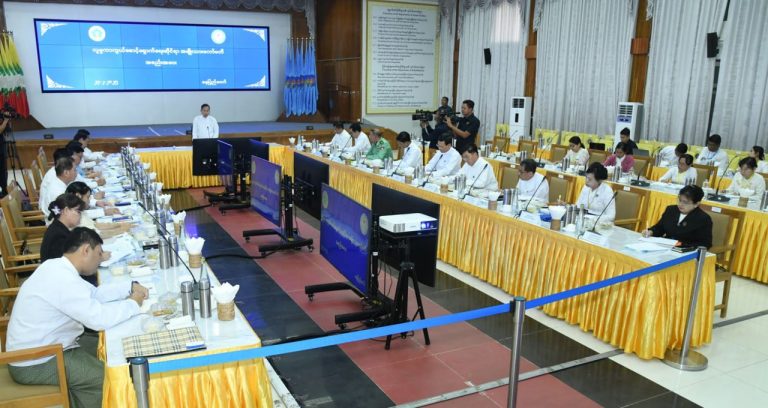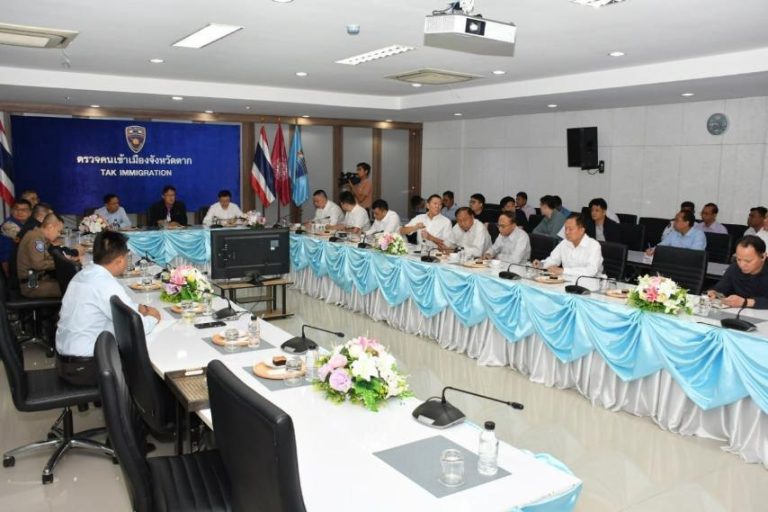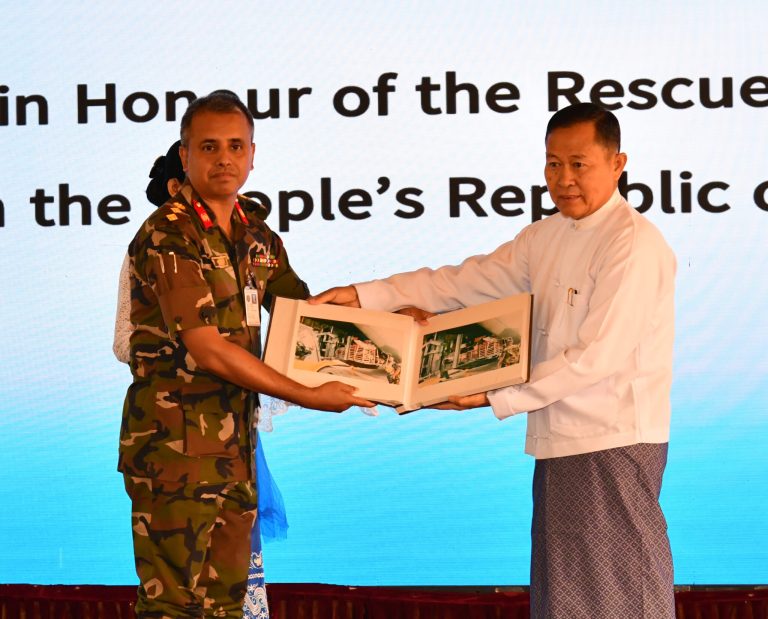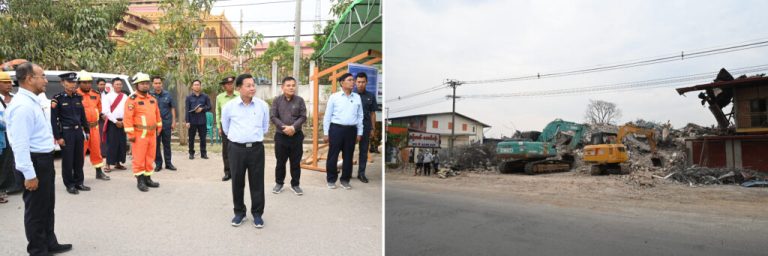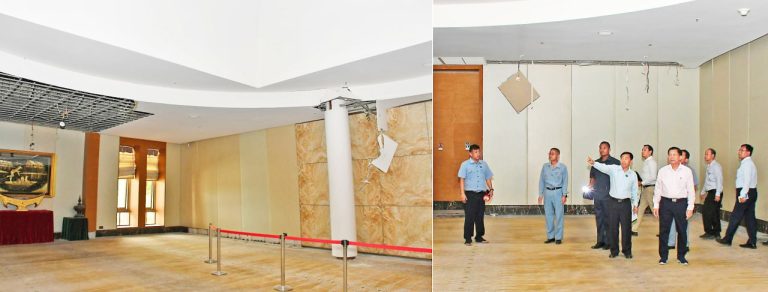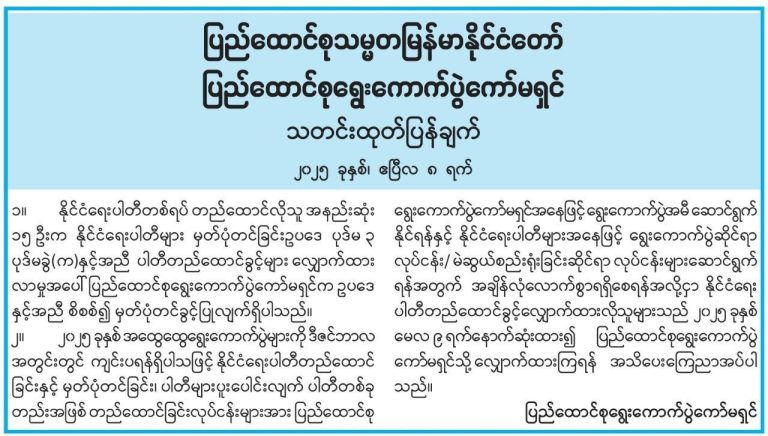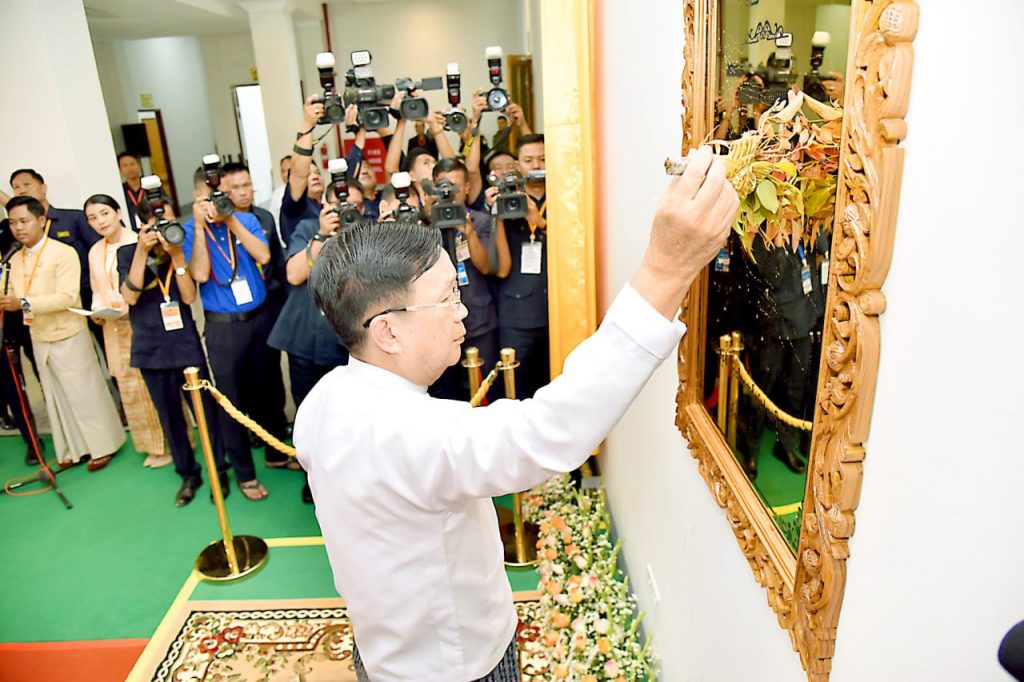
2 January 2025
The opening ceremony ofnew Judicial College building of Union Supreme Court in Ottarathiri Township, Nay Pyi Taw Council Area was held this morning.
On behalf of Chairman of State Administration Council Prime Minister Senior General Min Aung Hlaing, SAC Secretary General Aung Lin Dway formally opened it.
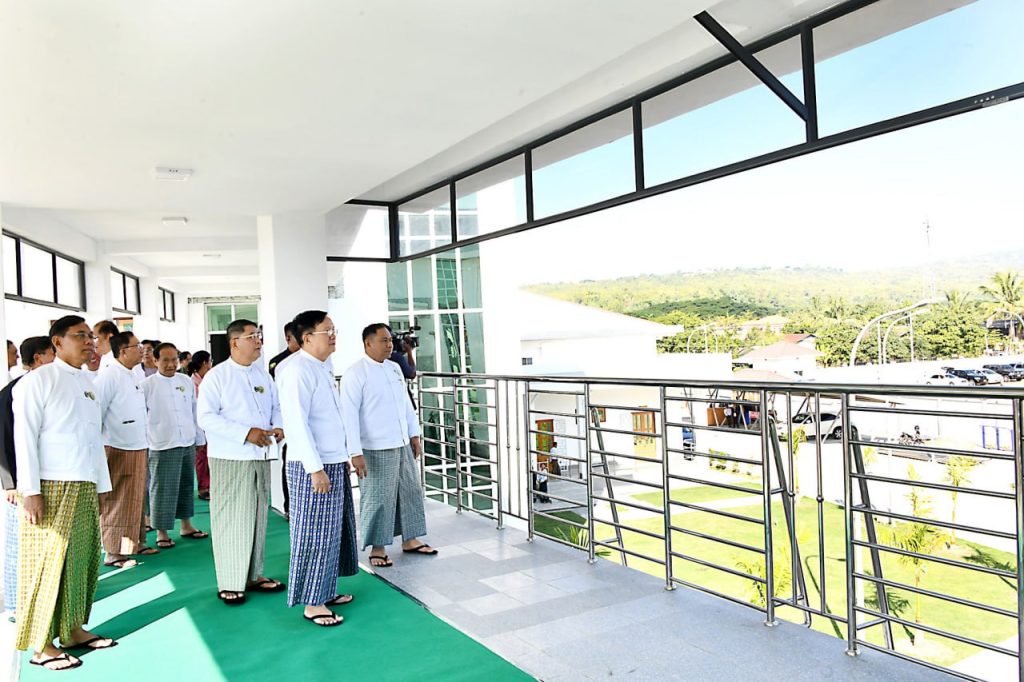
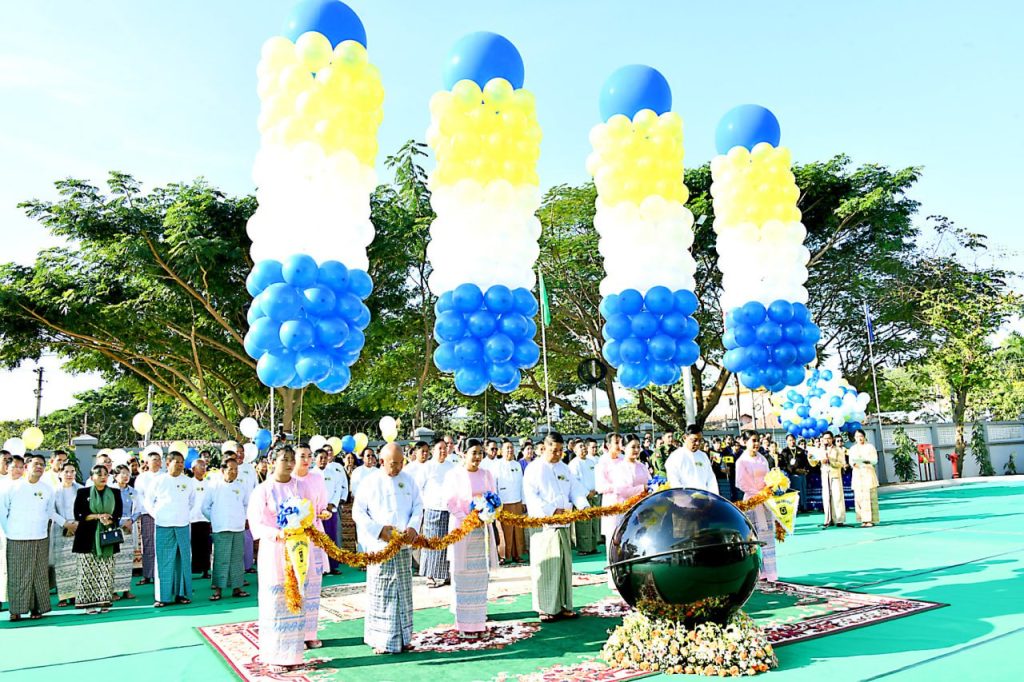
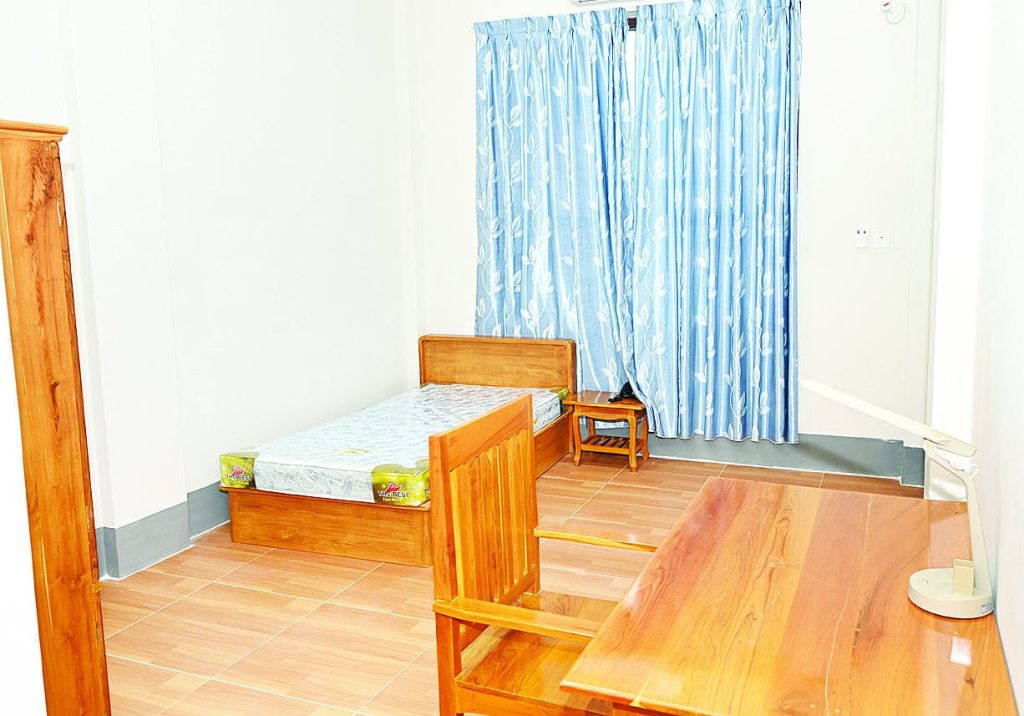
Also present were SAC members, union level officials, union ministers, senior military officers from the Office of the Commander-in-Chief, the Nay Pyi Taw Command commander, deputy ministers, Supreme Court judges, members of the Constitutional Tribunal, members of Anti-Corruption Commission, region/state high court chief justices, the chair of Union Legal-Aid Association, officials of ministries and legal officers of Union Supreme Court.
Union Chief Justice U Tha Htay, Chair of Constitutional Tribunal U Aung Zaw Thein, and Union Minister for Construction U Myo Thant formally opened the new building.
The SAC Secretary unveiled the signboard of the Judicial College building, and posed for documentary photo together with attendees.
The SAC Secretary and attendees sprinkled scented water on the plaque of the building.
At the second part of the ceremony, they watched a video clip on the Judicial College.
The Union Construction Minister handed over the related papers to the Union Chief Justice, who presented a commemorative gift to the SAC Secretary.
On behalf of the Senior General, the SAC Secretary delivered address. He said today, Judicial College, the first advanced level judicial studies centre, was opened. Hence, the Day goes down in the annals of the nation with pride, in addition to the judicial sector.
World countries have set up centres under various names, such as Judicial Academy, Judicial College, Judicial Training Centre, for improving the judicial sector, and development of judicial knowledge.
They invite judges from the world countries, and conduct trainings, discussions, talks, knowledge exchange programs for development of judicial system.
Judicial exchange program not only provides assurance for foreign investments but also enhances friendly relations between countries. Hence, it is a curial centre for the country.
The grand college built at a huge cost will open learning and study courses for foreign scholars as well as new judges, mid-level judges and senior judges of Myanmar. Hence, it can be effectively used for enhancing the capacity of judges.
The State Administration Council, in accordance with Article 419 of the Constitution, is exercising the three branches of state power—legislative, executive, and judicial—in compliance with the law. In carrying out these functions, the judicial independence stipulated under Article 19 of the Constitution is upheld, ensuring a fair and expeditious judiciary. Moreover, under Article 11 of the Constitution, legislative and executive powers are exercised without interference in judicial matters, adhering as much as possible to the principle of separation of powers.
These constitutional principles, responsibilities, and authorities related to the judiciary are fully entrusted to and exercised by the Union Supreme Court, as widely recognized.
Additionally, the government wishes to highlight its efforts to promote the development and advancement of the judiciary and establish a judicial system that earns public trust and confidence.
In fostering a trusted judicial system, the prudence, integrity, and competence of judges play a crucial role, as do the proper structuring and well-being of court institutions, which are also vital elements.
Therefore, to ensure that courts are well-equipped and meet proper standards, the government has constructed new High Courts in regions such as Mandalay and Mon State, as well as five new District Courts.
In addition, the government has implemented measures to support the judiciary by providing outfit allowances for all judges in Myanmar, as well as additional allowances for mandatory outfits required for their official duties. These efforts demonstrate the government’s commitment to addressing the needs of the judicial sector.
In acknowledging these governmental efforts to promote the development of the judiciary, a special message is directed to the judges of the Union Supreme Court and various subordinate courts.
It emphasizes that “in judicial proceedings, it is not only essential to render just decisions but also to ensure that such justice is visibly demonstrated to the public.” Judges are urged to uphold their love for justice, foster goodwill and compassion for the nation and its people, and strive to be capable and exemplary judges in their roles.
At present, the State Administration Council is fulfilling various national responsibilities in accordance with the Constitution, guided by its Five-Point
Roadmap and Nine Objectives.
Among these, the emphasis on “the rule of law” has been clearly stated and prioritized.
To fully realize the rule of law, accuracy and expediency in the judicial process play a critical role.
Therefore, judges are urged to exert their utmost efforts in fulfilling their responsibilities effectively in their respective roles.
In line with the objectives for the establishment and inauguration of the new Judicial College, this institution aims to foster cooperation with international partners, including ASEAN member states, through dialogue and exchange on judicial matters. By promoting international collaboration, it seeks to strengthen Myanmar’s reputation as a nation that offers judicial protection and instills confidence for investment.
Judges are encouraged to work towards ensuring that Myanmar’s judiciary is recognized not only within ASEAN but globally, as a system that upholds fairness, independence, and equality.
This would reflect the universal principles of justice, liberty, and equity. The efforts aim to enhance Myanmar’s standing as a respected and admired judiciary on the global stage.
Afterward, the Chief Justice of the Union delivered a note of gratitude, and following the ceremony, the Secretary of the State Administration Council and other attendees toured the interior of the new Judicial College building.


